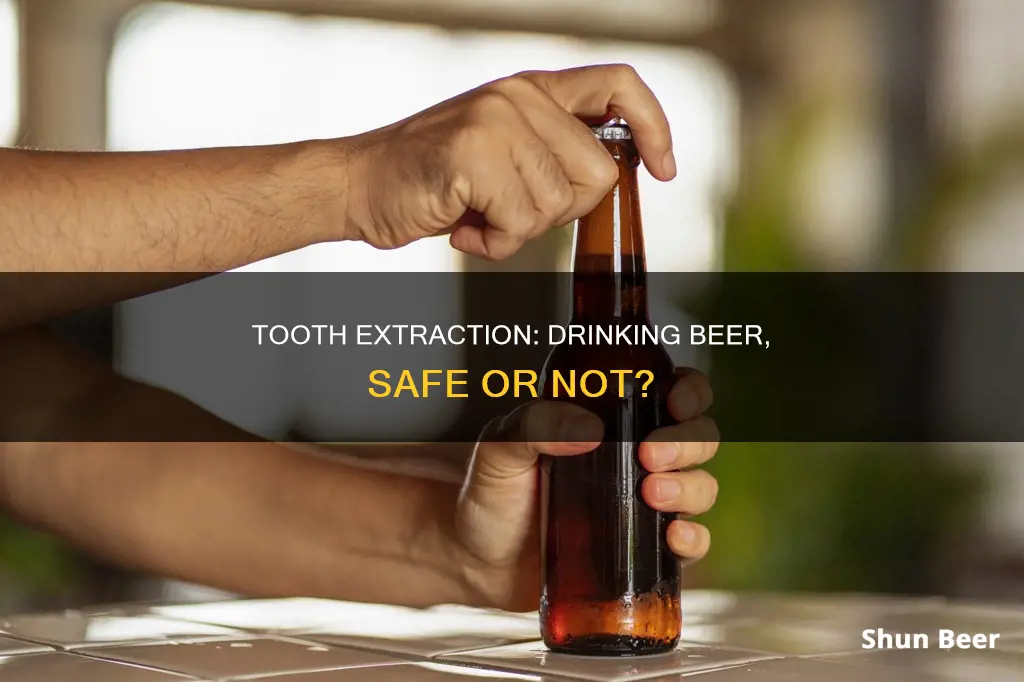
It's natural to want to relax with a beer after a tooth extraction, but it's best to avoid alcohol if you want a smooth and speedy recovery. After a tooth is removed, a blood clot must form over the extraction site to protect it and allow it to heal properly. This process can take about a week, and drinking alcohol can increase the risk of the blood clot dislodging, leading to a painful condition called dry socket. Alcohol can also cause dehydration, hinder the body's natural healing process, and increase the risk of infection. It's also important to note that alcohol can interact with pain medications, increasing the risk of negative side effects. To ensure a successful recovery, it's recommended to wait at least 7 to 10 days after a tooth extraction before consuming alcohol.
| Characteristics | Values |
|---|---|
| Alcohol consumption after tooth extraction | Not recommended |
| Reason | Risk of delayed healing |
| Average healing time | 7 to 10 days |
| Dehydration | Alcohol causes dehydration |
| Blood clotting | Alcohol thins the blood and prevents clotting |
| Dry socket | Alcohol increases the risk of dry socket |
| Pain medication | Alcohol can have adverse reactions with pain medication |
| Alternatives | Water or lukewarm tea |
What You'll Learn
- Dentists recommend avoiding alcohol after a tooth extraction
- Drinking alcohol can cause a painful condition called dry socket
- Alcohol hinders the body's natural healing process
- Drinking alcohol while taking pain medication can increase the risk of negative side effects
- It's best to wait until you no longer require pain medication before drinking alcohol

Dentists recommend avoiding alcohol after a tooth extraction
Tooth extraction is a common dental procedure, but it still requires aftercare to ensure a smooth recovery. While you may be tempted to relax with a drink after the procedure, dentists advise against consuming alcohol following a tooth extraction. Here's what you need to know about why alcohol should be avoided and how to ensure a successful recovery.
Reasons to Avoid Alcohol After a Tooth Extraction
The primary reason dentists recommend avoiding alcohol after a tooth extraction is to allow for proper healing. After a tooth is removed, a blood clot needs to form over the extraction site to initiate the healing process. This typically takes about a week. Alcohol consumption can interfere with this critical process by thinning the blood and hindering clot formation, leading to a condition called dry socket.
Complications of Dry Socket
Dry socket is a painful condition where the blood clot in the extraction site dislodges or fails to form, leaving the underlying bone and nerves exposed. This complication slows down the healing process and increases the risk of bacterial infection. It can cause radiating pain in the mouth and face, requiring additional treatment and follow-up visits to the dentist.
How Long to Wait Before Consuming Alcohol
Most dentists recommend waiting at least 72 hours after a tooth extraction before consuming alcohol. To be on the safe side, it is advisable to wait for about 7 to 10 days. This allows the blood clot to fully form and the extraction site to heal properly. During this time, it is crucial to follow your dentist's aftercare instructions and maintain good oral hygiene.
Alternative Ways to Relax and Aid Recovery
While alcohol should be avoided, there are several alternative ways to relax and promote a smooth recovery:
- Get plenty of rest after the extraction. It is recommended to take it easy for at least 24 hours.
- Apply a cold compress or ice pack to the cheek near the extraction site to reduce swelling, pain, and bruising.
- Avoid using straws or spitting for at least 24 hours to prevent dislodging the blood clot.
- Drink plenty of water to stay hydrated, which is essential for the healing process.
- Eat nutritious soft foods that are easy to chew and not too hot or spicy.
- Avoid smoking or using tobacco products for at least three days after the extraction.
By following these guidelines and your dentist's advice, you can ensure a quick and comfortable recovery after a tooth extraction.
Beer and Radiation: What's Safe to Drink?
You may want to see also

Drinking alcohol can cause a painful condition called dry socket
Drinking Alcohol After a Tooth Extraction
After a tooth extraction, it is normal to experience some discomfort. Alcohol is a common go-to for many to alleviate pain and help them relax. However, dentists advise against consuming alcohol after a tooth extraction. Alcohol can cause dehydration, hindering the healing process and potentially leading to a condition called dry socket.
When a tooth is extracted, a blood clot must form and cover the nerves in the empty socket to stop bacteria from forming. Alcohol can prevent this clot from forming or dislodge it, exposing the nerves and bones to bacteria and causing a painful condition called dry socket.
Research has shown that alcohol has a blood-thinning effect, which can prevent blood clotting. Alcohol also acts as an oral irritant, inflaming tissues and reducing the body's ability to produce saliva, making it harder for clots to form.
Dentists recommend avoiding alcohol for at least 72 hours after a tooth extraction, with some suggesting abstinence for up to 7-10 days. This allows the wound to close and the blood clot to form and stabilize, reducing the risk of dry socket.
Alternatives to alcohol
Instead of alcohol, it is recommended to drink hydrating beverages such as water, milk, or lukewarm tea to aid the healing process. Maintaining good oral hygiene and getting plenty of rest are also important for a smooth recovery.
Morphine and Beer: A Dangerous Mix?
You may want to see also

Alcohol hinders the body's natural healing process
Alcohol consumption can interfere with the body's natural healing process, slowing down recovery and leading to potential complications. Here are some ways in which alcohol can hinder the body's healing process:
- Impaired Immune Function: Alcohol can impair the immune system, reducing the body's ability to repair damaged tissues effectively.
- Increased Inflammation: While inflammation is a natural part of the healing process, alcohol can contribute to excessive inflammation, hindering healing and increasing pain and discomfort.
- Nutritional Depletion: Alcohol can deplete the body of essential vitamins and minerals necessary for tissue repair and overall health. Proper nutrition is crucial for effective healing.
- Interaction with Medication: Alcohol can negatively interact with certain medications, including pain relievers, leading to adverse effects or reduced effectiveness.
- Impaired Cognitive Function: Alcohol consumption can impair judgement and cognitive function, making it difficult to make informed decisions about physical activity, medication management, and self-care during the recovery process.
- Risk of Accidents: Alcohol can impair coordination and balance, increasing the risk of accidents or falls, which could lead to re-injury or exacerbation of the existing condition.
- Disruption of Sleep Patterns: Quality sleep is essential for the body's healing processes, and alcohol can negatively affect sleep patterns.
- Interaction with Pain Medication: Alcohol may interact with pain medications, affecting their effectiveness and potentially increasing the perception of pain.
- Mental Health Impact: Alcohol consumption can exacerbate feelings of depression and anxiety, and injury recovery can be a mentally challenging time. Prioritising mental well-being is important.
- Dehydration: Alcohol is a diuretic, leading to increased urination and dehydration. Proper hydration is crucial for tissue healing and overall health.
Tooth Extraction and Beer: What's Safe?
You may want to see also

Drinking alcohol while taking pain medication can increase the risk of negative side effects
It is not recommended to consume alcohol after a tooth extraction. Doing so may cause adverse effects on your healing time and can lead to unnecessary complications that may prolong your recovery.
However, it is important to note that this guideline specifically addresses the consumption of alcohol after a tooth extraction. It does not consider the interaction of alcohol with pain medications, which is a separate concern. Drinking alcohol while taking pain medication can be dangerous and potentially life-threatening.
When alcohol and pain medication are consumed simultaneously, the liver becomes overwhelmed as it works to metabolize both substances. This can lead to a buildup of medication in the bloodstream, increasing the potency of the pain medication and the likelihood of adverse side effects.
- Overdose: The combination of alcohol and pain medication can lead to a toxic amount of substances in the body, resulting in respiratory depression (slowed breathing), cardiovascular changes (increased blood pressure), gastrointestinal problems (nausea and vomiting), seizures, loss of consciousness, and organ damage.
- Impaired judgment: Alcohol impairs judgment, making it more difficult to recognize symptoms of medication side effects or overdose. Consuming alcohol and pain medication simultaneously will accelerate impairment as the body has to process and detox from both substances.
- Liver damage: Both alcohol and pain medication can be harmful to the liver. The liver has to work harder when processing multiple substances, increasing the risk of liver damage and failure.
- Gastrointestinal bleeding: Certain pain medications can irritate the stomach lining and increase the risk of gastrointestinal bleeding. Consuming alcohol in addition to these medications further elevates the risk of bleeding.
- Worsening of pain symptoms: Alcohol can dehydrate the body and exacerbate pain. When the effects of alcohol and pain medication wear off, pain may worsen and become more challenging to manage.
It is generally recommended to avoid alcohol completely while taking pain medication to prevent potential interactions, side effects, and health risks. However, it is always best to consult your healthcare provider or pharmacist for personalized advice based on your specific medication and health condition. They can provide guidance on the length of time you should refrain from drinking alcohol and suggest alternative ways to manage pain or relax, such as drinking water or lukewarm tea.
Beer O'Clock: When Work Lunches Need a Lift
You may want to see also

It's best to wait until you no longer require pain medication before drinking alcohol
After a tooth extraction, it's best to wait until you no longer need pain medication before drinking alcohol. This is because consuming alcohol while taking painkillers can lead to adverse reactions, dangerous side effects, and unexpected health risks.
Firstly, alcohol can hinder the healing process after a tooth extraction. It can cause dehydration, thinning your blood when it needs to form a clot in the empty socket, and increase the risk of infection. This can lead to a condition called dry socket, where the blood clot becomes dry and dislodges, resulting in a slow and painful recovery.
Secondly, drinking alcohol while taking pain medication can increase the risk of negative side effects and interactions. Alcohol can enhance the effects of pain medication, causing a more intense high but also making you extremely drowsy. As a result, your breathing and heart rate may slow down, your oxygen levels may drop, and you could slip into a coma. This combination can even lead to organ damage, loss of consciousness, and death.
Additionally, alcohol can interact with common over-the-counter pain medications such as Tylenol, ibuprofen (Motrin, Midol, Advil), and aspirin. Mixing alcohol with these medications can lead to irreversible liver damage, gastrointestinal bleeding, internal bleeding, stroke, or kidney failure.
Therefore, it is crucial to wait until you have finished taking your pain medication before consuming alcohol. Always follow your dentist's aftercare instructions and consult your doctor or pharmacist if you have any questions about alcohol consumption during your recovery.
Protein and Beer: Mixing, Myths, and Health
You may want to see also
Frequently asked questions
No, it is not recommended to drink beer or any other alcoholic beverage after a tooth extraction. Alcohol can thin your blood and prevent it from clotting, which is necessary for the healing process.
A blood clot forms over the extraction area to protect it. Without this blood clot, you could suffer from a painful condition called "dry socket", which delays your recovery.
It's recommended to wait at least 72 hours and ideally 7-10 days after a tooth extraction to drink alcohol. This allows the blood clot to fully form and the extraction site to finish healing.
It's important to stay hydrated during the healing process, so drinking water is recommended. However, avoid drinking through a straw as it could dislodge the blood clot and cause dry socket.







